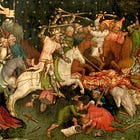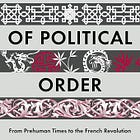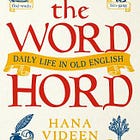2024's reading theme was Nonfiction.
Over the course of the year I at least attempted to read 10 nonfiction books, which is significant increase from my usual 0 nonfiction books in a year. Of these books, I did not finish (DNF) 3 of them.
Initially, this theme was chosen so I could actually get into some of the unread history books on my shelf. If I’m going to own my degrees and call myself a historian, I figured I should at least try to read the books in my collection. I also included some variety for spice, which ended up including more writing books than I expected.
There was quite a lot of Anglo-Saxon and other British history, which isn’t all that surprising really. Even during my degrees I gravitated toward Late Antiquity and the early Middle Ages in Britain as a focus. But it’s still interesting to see that’s how things shook out as my list shaped itself during the year.
I also confirmed that I still don’t like religious history or biographies. I like nonfiction that’s well written and not dry. A conversational tone is nice, and easy to read, but I don’t mind reading something more scholarly if it’s well presented.
Below is every nonfiction book I read in 2024, each with my rating and a link to the full review post.
My Rating: ★★☆☆☆
My Rating: ★★★☆☆
My Rating: ★★★★☆
My Rating: ★★★★★
My Rating: ★★☆☆☆ (DNF)
My Rating: ★★★★☆
My Rating: ★★★★☆
My Rating: ★★★☆☆
Did Not Finish (DNF)
In addition to The Origins of Political Order, there were a few other books I tried to read but did not finish. They are:
The Tragedy of the Templars: The Rise and Fall of the Crusader States by Michael Haag
I think I mentioned it in at least one previous book review, but I really don’t like the history of religion. I find it really boring, even though I know it’s incredibly important. With Tragedy of the Templars, the writing was too dry to keep me engaged on a subject I normally try to avoid.
Haag also decided to give a detailed history of both the Judeo-Christian religions and Islam to set the scene, which means the titular Templars don’t even show up until halfway through the 400-page book, and I was gone.
To its credit, though, I learned much more about Muhammad and the origins of Islam in fewer pages than the chapter devoted to him in Great Commanders. So that’s something at least.
But Tragedy of the Templars went to the donate pile for someone with a stronger interest to hopefully pick up someday. It even has a stamp from Rosslyn Chapel in it! (If you know you know.)
The Anglo-Saxons: A History of the Beginnings of England by Marc Morris
This book wasn’t DNF because I didn’t like it, I just had too many things going on at the time I tried to read it. And as another nearly-500-pager, it’s pretty intimidating to pick up again after putting it down for a while.
I actually got farther into it than I thought; I imagine the narrative approach to the history helped things along. So it’s gone back onto my shelf (with a bookmark) for whenever I’m ready to give it another go.
Everything Else
Normally I include a list of everything else I read during the year that wasn’t on theme, but this post is long enough as it is. So stay tuned for a Part 2 of the roundup where I briefly go through all the fiction I read while trying to push through the nonfiction this year.
As for 2025’s theme, it’s going to be an interesting one. M and I decided on it back in August, and as usual we’re quite excited. It’ll be a nice break from the nonfiction slog us little fiction gremlins had to endure this year.
The theme for 2025, and my reading list, will be announced in January.











